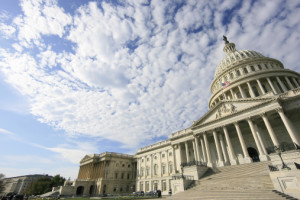
The Supreme Court blocks a Texas law limiting the moderation of speech on social media, the Justice Department reviews the police response to the Uvalde shooting, and more…
IN THE NEWS.
- The U.S. Supreme Court temporarily blocked a Texas law that restricted the ability of social media companies to remove posts based on a user’s political speech. Texas’s law would also have required companies with more than 50 million active monthly users to disclose their methodology for moderating content. In dissent, Justice Alito argued that the temporary injunction blocking the law represented a “significant intrusion on state sovereignty.” The case will now return to the 5th Circuit Court of Appeals for a full ruling on the merits of the law.
- The U.S. Department of Justice announced that the Department’s Office of Community Oriented Policing Services will conduct a “critical incident review” of law enforcement’s response to the school shooting in Uvalde, Texas. Don McLaughlin, Mayor of Uvalde, requested the review, which can be expected to produce a conclusory report of the events to inform future law enforcement how to improve responses to active shooter incidents. The Office of Community Oriented Policing has conducted and published critical incident reviews for mass shootings in the past, such as for the 2016 Pulse nightclub attack in Orlando and the 2015 Inland Regional Center shooting in San Bernardino.
- The Biden-Harris Administration announced an initiative to modernize building codes to lower energy costs and combat climate impacts on housing. The initiative directs $225 million in funding to the U.S. Department of Energy to support implementation of its resilient and efficient codes program. Through this program, the Energy Department plans to track state compliance and address barriers to compliance with commercial and residential modern energy codes. The Administration’s announcement of the initiative follows a previous announcement from the Administration in May about a new collaboration between the U.S. Environmental Protection Agency (EPA), the Energy Department, the White House Council on Environmental Quality, and the U.S. General Services Administration to develop federal building efficiency standards aimed at helping reach net zero federal carbon emissions by 2045.
- The U.S. Department of Health and Human Services (HHS) announced the creation of an Office of Environmental Justice to protect vulnerable populations from the health effects of pollution and other environmental health concerns. In its announcement, HHS elaborated that it intends the Office of Environmental Justice to lead initiatives to improve the health of disadvantaged U.S. communities. Commenting on the new office, HHS Secretary Xavier Becerra stated that “many communities across our nation — particularly low-income communities and communities of color — continue to bear the brunt of pollution from industrial development.”
- The U.S. Department of the Interior announced a rate reduction policy to increase renewable energy production on public lands managed by the Bureau of Land Management. The announcement projected that the policy—through the creation of new renewable energy coordination offices—should increase BLM’s processing capacity of renewable energy proposals. Secretary of the Interior Deb Haaland noted that “clean energy projects on public lands have an important role to play in reducing our nation’s greenhouse gas emissions.”
- HHS issued a final rule withdrawing an earlier rule that would have required HHS to review all of its 18,000 existing regulations before they expired in 2026. The earlier rule was previously finalized on the last day of former President Donald Trump’s Administration. In its withdrawal notice, the Department argued the automatic expirations could have impeded its “ability to fulfill its public health and human services missions, promote national priorities, and confront the challenges facing the nation.”
- EPA announced $97 million of loans under the Water Infrastructure Finance and Innovation Act to the Medford Water Commission to modernize water infrastructure in Medford, Oregon. The commission plans to use the loans to ensure access to safe and reliable drinking water by establishing infrastructure that is resilient to natural disasters. The commission expects that the loans will save Medford $12 million and create 600 jobs. According to EPA, loans under the Water Infrastructure Finance and Innovation Act have thus far financed over $32 billion in water infrastructure upgrades, created nearly 97,000 jobs nationally, and saved ratepayers more than $5 billion.
- The Justice Department and the U.S. Department of Homeland Security (DHS) issued an interim final rule concerning asylum seekers. Under the rule, if DHS determines that asylum seekers have a credible fear of persecution or torture, DHS must, within 45 days, refer asylum seekers to the U.S. Citizenship and Immigration Services for an asylum merits interview. Following an interview, DHS may either grant asylum seekers benefits or refer them to an expedited removal process. DHS stated that the new rule is expected to quicken the hearing and removal processes for asylum seekers, which previously have taken years to conclude.
WHAT WE’RE READING THIS WEEK
- In a National Bureau of Economic Research (NBER) working paper, Markus Gehrsitz, senior lecturer at the University of Strathclyde, and NBER research associates Henry Saffer and Michael Grossman, argued that alcohol excise taxes cause heavy drinkers to reduce their alcohol purchases but also leave low-income drinkers purchasing less alcohol and paying more for it. Gehrsitz, Saffer, and Grossman noted, however, that low-income drinkers make up only 22 percent of all heavy drinkers. Accordingly, Gehrsitz, Saffer, and Grossman concluded that the negative impacts of alcohol excise taxes on low-income drinkers may be justified by these overall reductions in heavy drinking.
- In a brief published by the Urban Institute, Michael Karpman, senior research associate at the Urban Institute, Kassandra Martinchek, a research associate at the Institute, and Breno Braga, a research affiliate at the Institute of Labor Economics, assessed the decline of medical debt following the COVID-19 pandemic. Karpman, Martinchek, and Braga theorized that the decline may have resulted from people’s decreased use of healthcare services during the pandemic, federal pandemic stimulus payments, and federal pandemic legislation which increased enrollment in Medicaid. To sustain the decline in medical debt after pandemic relief subsides, Karpman, Martinchek, and Braga suggested that health insurance reforms may be part of the solution by addressing the Medicaid coverage gap, extending the American Rescue Plan Act’s premium reducing provisions, and enforcing medical provider compliance.
- In a forthcoming article in the Journal of Accounting and Public Policy, Dichu Bao, professor at Deakin University, and Hong Kong Polytechnic University professors Lixin (Nancy) Su and Yong Zhang described the results of their study of the effects of a 2006 U.S. Securities and Exchange Commission rule mandating chief financial officer (CFO) compensation disclosures. Bao, Su, and Zhang compared CFO job performance by contrasting a control group of firms that already disclosed CFO compensation before 2006 with those that implemented disclosure after the rule took effect, using the metrics of accounting misstatements and unexplained audit fees. Bao, Su, and Zhang indicated that their study found positive improvement in CFO performance substantiating “the SEC’s intended benefits” of increasing executive officer accountability and increasing transparency.
EDITOR’S CHOICE
- In an essay in The Regulatory Review, Jeff Kosseff, assistant professor at the S. Naval Academy, argued that Congress should appoint a commission of experts to inform the debate surrounding Section 230 of the Communications Decency Act, which shields website providers from liability for content created by third parties. Kosseff explained that many commonly held beliefs about the law are based on anecdotal evidence and not supported by facts. As a result, Kosseff contended that a congressional commission should examine how platforms develop and implement moderation policies and use those findings to issue recommendations about potential changes to Section 230.



